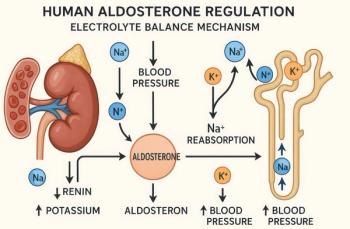
Hypertension: New Findings on an Old Foe
Awareness of this major health problem is on the rise, as evidenced by numerous recent reports about important new study findings.
Hypertension remains the leading risk factor for disability and death in this country and around the world. Awareness of this major health problem is on the rise, as evidenced by numerous recent reports about important new study findings, including the following:
• Low levels of vitamin D can trigger hypertension, according to the
Observational studies have already shown the link between vitamin D and hypertension, but a large-scale genetic study was necessary before the cause and effect could be proven, reported Dr Vimal Karani, Institute of Child Health, University College London, London, UK, at the annual conference of the European Society of Human Genetics.
Data from the D-CarDia collaboration, involving 35 studies, more than 155,000 patients, and numerous centers in Europe and North America, showed that those with high concentrations of 25-hydroxyvitamin D had reduced blood pressure and therefore a reduced risk of hypertension, Dr Karani noted.
• Women and men react the same to non–diuretic-based antihypertensive therapies, such as an angiotensin-converting-enzyme inhibitor (lisinopril) or a calcium channel blocker (amlodipine), as well as a diuretic therapy (chlorthalidone) given to treat hypertension and reduce its cardiovascular complications, according to a recent subgroup analysis of the
Researchers at the University of Alabama at Birmingham sought to determine which drugs better treated patients with hypertension and prevented cardiovascular disease and its complications in women. They found that diuretics are superior in reducing the cardiovascular complications of hypertension when used as the initial treatment.
The findings are significant because hypertension is highly prevalent, difficult to control, and associated with a high incidence of cardiovascular disease complications in older women, said the study's lead author, Suzanne Oparil, MD, Professor of Medicine in the UAB Division of Cardiovascular Disease. They should be considered when physicians develop a treatment plan for patients with newly diagnosed hypertension, she noted, and both men and women can benefit by starting therapy with a diuretic.
The study was published in the May issue of the journal Hypertension.
•
Among patients who were taking 3 or more antihypertensive medications, the risk of resistant blood pressure was 3 times higher in those who had severe obstructive sleep apnea compared with moderate obstructive sleep apnea after adjusting for age, body mass index, and diabetes mellitus.
The findings are important because poor blood pressure control in patients taking multiple antihypertensive medications makes them particularly vulnerable to increased cardiovascular risk, according to Harneet Walia, MD, Assistant Professor of Family Medicine at the Cleveland Clinic Lerner College of Medicine of Case Western Reserve University.
•
If 90% of mothers in the United States breast-fed their babies for 12 months or longer, there would be at least 53,000 fewer cases of hypertension, 14,000 fewer cases of heart attack, and nearly 5,000 fewer cases of breast cancer, the results showed.
Breast-feeding also benefits mothers in that it strengthens the bond between mother and child, protects the mother from certain cancers, and lowers the risk of obesity and heart disease, it was noted.
• Persisting diastolic dysfunction and elevated LV mass after
The large, comprehensive, long-term study of the postnatal cardiac and hypertensive consequences of preeclampsia highlights the previously underestimated cardiac burden of this pregnancy disorder, wrote the authors, who were led by Dr Chahinda Ghossein-Doha at the Maastricht University Medical Center in the Netherlands. They noted that cardiovascular disease often is recognized late in its development, even in women with a history of preeclampsia, and that the current findings could help identify disease sooner.
The study was published online in the journal Hypertension.
Newsletter
Enhance your clinical practice with the Patient Care newsletter, offering the latest evidence-based guidelines, diagnostic insights, and treatment strategies for primary care physicians.

































































































































